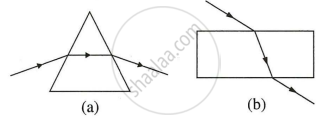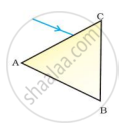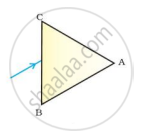Advertisements
Advertisements
Question
A ray of light is normally incident on one face of an equilateral glass prism. Answer the following:
What is the angle of refraction from the first face of the prism?
Solution
The incident beam passes through a glass prism without deviating, and the angle that the refracted ray makes with the normal is known as the Angle of Refraction. This is zero (0°) in this instance.
APPEARS IN
RELATED QUESTIONS
Diagrams (a) and (b) in figure below show the refraction of a ray of light of single colour through a prism and a parallel sided glass slab respectively.

- In each diagram, label the incident, refracted, emergent rays and the angle of deviation.
- In what way the direction of emergent ray in the two cases differ with respect to the incident ray? Explain your answer.
How does the angle of deviation depend on the refracting angle of the prism?
A ray of light is normally incident on one face of an equilateral glass prism. Answer the following:
What will be the angle of incidence at the second face of the prism?
A ray of light incident at an angle of incidence 48° on a prism of refracting angle 60° suffers minimum deviation. Calculate the angle of minimum deviation.
[Hint: δmin = 2i - A]
What should be the angle of incidence for a ray of light which suffers a minimum deviation of 36° through an equilateral prism?
[Hint: A = 60°, i = (A + δmin)/2]
Assertion: The light emerges from a parallel-sided glass slab in a direction perpendicular to that in which enters the glass slab.
Reason: The perpendicular distance between the original path of the incident ray and the emergent ray coming out of the glass slab is called lateral displacement of the emergent ray of light.
A prism ABC (with BC as base) is placed in different orientations. A narrow beam of white light is incident on the prism as shown in below Figure. In which of the following diagrams, after dispersion, the third colour from the top of the spectrum corresponds to the colour of the sky?
How will you use two identical prisms so that a narrow beam of white light incident on one prism emerges out of the second prism as white light? Draw the diagram.
White light is dispersed by a prism. Inside the prism, compared to the blue light, the red light ______.
State three factors on which the angle of deviation depends.




